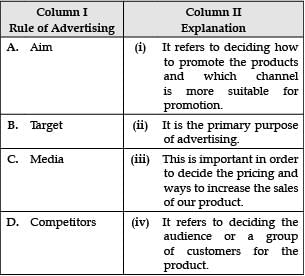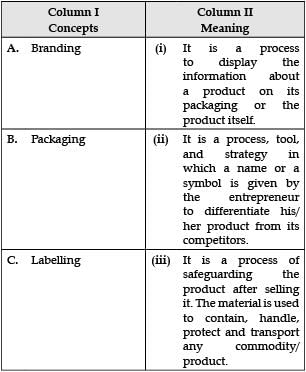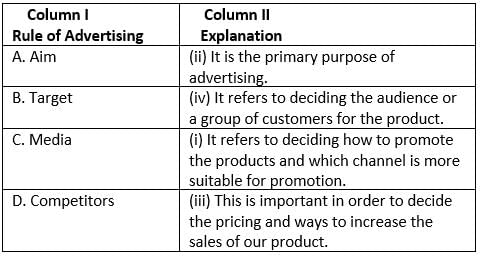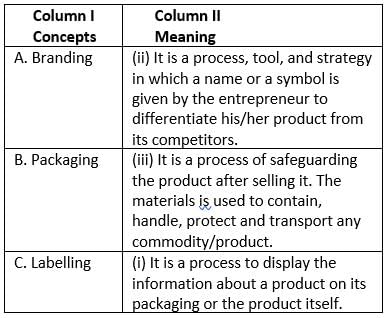Test: Enterprise Marketing- 2 - Commerce MCQ
18 Questions MCQ Test - Test: Enterprise Marketing- 2
Sita is planning to start a business of manufacturing cricket balls. She has decided to keep the brand name as ‘Super Balls’, and has also planned everything about the logo, brand mark and trademark. According to her, she has selected and decided all the components of a brand. Is selection and components of a brand decided by her are true or false.
Ram and Rohan are leading an advertising firm. They recruited new graduates through college placements. During an interview, they asked one of the students to list down four rules for planning any advertising activity. He responded with the following: Desire, Aim, Target and Competitors. Mention whether the identified rules are true or false.
Guru is planning to start a business of retailing leather products. He along with his friend is formulating the sales strategy he would use to promote the products. He is analysing the prices of competitor’s products and fixing the prices of his products accordingly. When he started to sell the products, he promoted these by comparing to its competitor’s products. According to his friend, Guru is using the direct sales strategy to sell his products. Identify whether Guru’s friend is right or wrong.
Match the rules of advertising with the correct explanation.

Given below are the concepts of Enterprise Marketing. Match them correctly with their meaning.

State Whether the Following Statements are True or False.
Q. The 4Ps that make up a typical marketing mix are – Price, Product, Publicity and Place.
State Whether the Following Statements are True or False.
Q. Producer-wholesaler-retailer-customer is the most common and traditional channel of distribution.
State Whether the Following Statements are True or False.
Q. Trademark is a graphic mark or emblem commonly used by commercial enterprises, organizations and even individuals to aid and promote instant public recognition.
State Whether the Following Statements are True or False.
Q. A sales strategy consists of a plan that positions a company’s brand or product to gain a competitive advantage.
State Whether the Following Statements are True or False.
Q. Variable pricing method helps the company in recovering the research and development costs.
State Whether the Following Statements are True or False.
Q. Promotion refers to all the activities undertaken to make the product or service known to the user and trade.
State Whether the Following Statements are True or False.
Q. Below-the-line promotions use mass media methods.
State Whether the Following Statements are True or False.
Q. Ambient refers to any form of advertising that occurs in a non-standard medium outside the home.
State Whether the Following Statements are True or False.
Q. B & h is a leading advertising firm. They recruit new graduates through college placements. During an interview, a student was asked to list the four rules for planning any advertising activity, he replied that the following is required: Aim, Target, Desire, Competitors.
State Whether the Following Statements are True or False.
Q. Personal selling relates to short–term incentives or activities that encourage the purchase or sale of a product or service.
State Whether the Following Statements are True or False.
Q. CRM is the abbreviation for client relationship management.
State Whether the Following Statements are True or False.
Q. Good negotiations contribute significantly to business success, as they help in avoiding future problems and conflicts.
State Whether the Following Statements are True or False.
Q. Vendor management is a term used to describe the process of finding, qualifying and doing business with vendors.
















